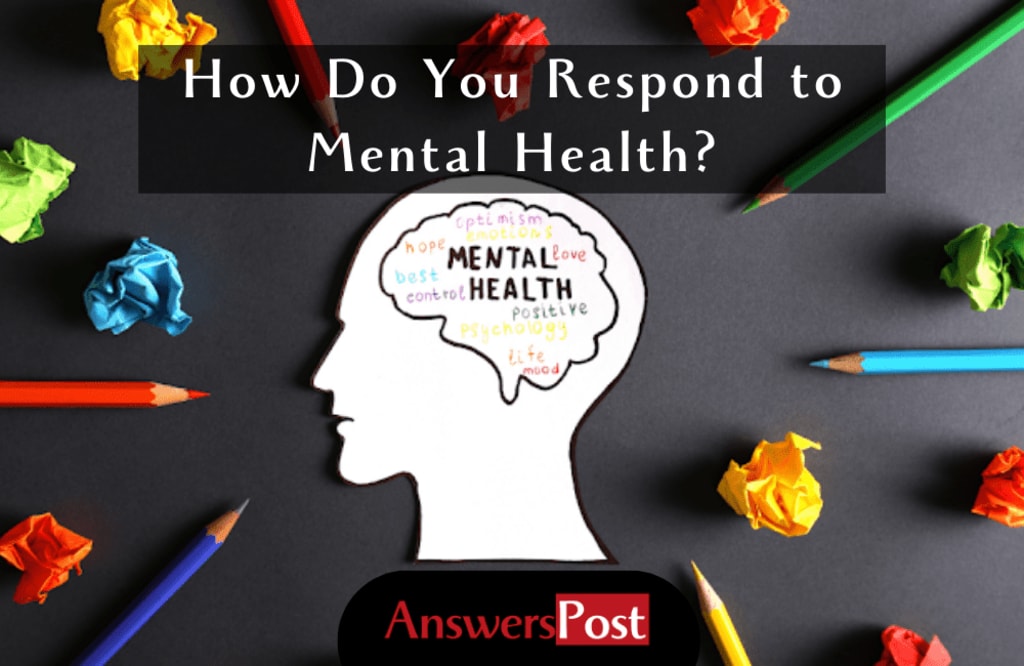How Do You Respond to Mental Health?
Find Ways to Reduce Stress

Mental health is a topic that is often stigmatized and not discussed. This section discusses the stigma of mental health, the importance of mental health, and how to respond to mental health. Some people do not feel comfortable discussing their mental health with others or acknowledging that they have a problem. This is because there is a lot of stigma surrounding it.
The most common stigma associated with mental illness is the idea that these individuals are "crazy" or "nuts." Mental health is an essential aspect of everyone's life. One should always be aware and care for their mental health as best.
How to Respond to Mental Health
Mental health is a complex and vital issue affecting people of all ages, backgrounds, and cultures. It is crucial to take care of our mental health and to seek help if we are struggling.
Here are some crucial tips for taking care of your mental health:
Take care of your physical health: Exercise, eat a healthy diet, and get enough sleep. These things can help improve your mental health and overall well-being.
Find ways to reduce stress: This might include practicing relaxation techniques like deep breathing or meditation, setting boundaries, or finding healthy ways to cope with stress, such as talking to a friend or therapist.
Seek social support: Surround yourself with supportive people who can listen and offer encouragement. You can also join a support group or participate in online communities to connect with others who are going through similar experiences.
Practice self-care: Take breaks when needed, engage in activities you enjoy, and make time for relaxation and fun.
Seek professional help: If you are struggling with your mental health and feel like you cannot manage on your own, it is essential to seek help from a mental health professional. They can provide support and treatment to help you cope with your feelings and improve your overall well-being.
Practice mindfulness: This involves paying attention to the present moment and your thoughts and feelings in a non-judgmental way. You can practice mindfulness through meditation, yoga, or simply focusing on your breath.
Set achievable goals: Setting and working towards achievable goals can give you a sense of accomplishment and purpose, which can improve your mental health.
Engage in activities that bring you joy: Whether it's hobbies, creative pursuits, or spending time with loved ones, finding activities that bring you happiness and fulfillment can improve your mental health.
Seek out positive relationships: Surrounding yourself with positive and supportive people can help boost your mood and improve your mental health.
Seek help if you're struggling: If you're working on your mental health and don't know where to turn, don't hesitate to seek help. You can talk to a trusted friend, family member, mental health professional, or support group. You necessarily don't have to go through this alone.
Practice self-compassion: Be kind and understanding towards yourself, especially during difficult times. Remember that everyone makes mistakes and that it's okay not to be perfect.
Take breaks from technology: Constant exposure to screens and social media can be overwhelming and negatively impact your mental health. Make time to disconnect and unplug from technology regularly.
Seek out nature: Spending time in nature has positively affected mental health. Take a walk in a park, hike, or spend time outside in the sunshine to boost your mood and reduce stress.
Practice gratitude: Focusing on what you are grateful for can help improve your mental health by shifting your focus to the positive aspects of your life. You can keep a gratitude journal or take a few moments each day to reflect on the things you are grateful for.
Seek help if you're struggling with addiction: If you're working with addiction, it's essential to seek help as soon as possible. Addiction can have serious adverse effects on your mental health and overall well-being. Many resources are available to help you overcome addiction and get the support you need.
Seek out creative outlets: Engaging in creative activities, such as art, music, or writing, can be a helpful way to express your emotions and improve your mental health.
Practice relaxation techniques: The techniques such as deep breathing, progressive muscle relaxation, or guided imagery can help reduce stress and improve mental health.
Seek professional help if you're struggling with grief: Grief is a normal and natural response to loss, but it can be overwhelming and challenging. If you're working with grief and feel like you can't manage on your own, it may be helpful to seek professional help from a therapist or grief counselor.
Seek out professional help if you're struggling with a mental health condition: If you're working with a mental health condition such as anxiety, depression, or bipolar disorder, it's essential to seek out professional help. A mental health professional can provide treatment and support to help you manage your symptoms and improve your mental health.
Take breaks and prioritize self-care: Taking breaks and making time for self-care is essential to avoid burnout and maintaining your mental health. This might include exercise, spending time with loved ones, or simply taking a break to relax and unwind.
Conclusion
In conclusion, taking care of your mental health is vital to your overall well-being. You can do many things to improve your mental health, including taking care of your physical health, reducing stress, seeking social support, practicing self-care, and seeking professional help if needed.
It's also important to be kind and understanding towards yourself and to seek out activities and relationships that bring you joy and fulfillment. Remember that it's okay to ask for help if you're struggling, and many resources are available to support you on your journey to better mental health.
Disclaimer: The original version of this post was published on AnswersPost.
About the Creator
Amir Hossain
I blog on everything and anything— hoping my blogs will make your days a bit happier!






Comments
There are no comments for this story
Be the first to respond and start the conversation.